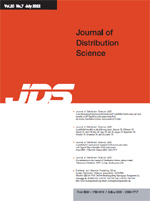Citizens’ Perceptions of the Smart City Distribution Strategy and Its Impact on Quality of Life: A Generational Perspective
Citizens’ Perceptions of the Smart City Distribution Strategy and Its Impact on Quality of Life: A Generational Perspective
- 한국유통과학회
- 유통과학연구(JDS)
- 제22권 제4호
-
2024.04115 - 126 (12 pages)
-
DOI : 10.15722/jds.22.04.202404.115
- 17

Purpose: This study aims to explore the citizens’ perceptions of the smart city distribution strategy and its impact on quality of life, classifying generations into two groups: Generation X with Baby Boomers, and Millennials with Generation Z. This study formulated research questions to explore how both generational groups perceive the impact of smart city experience, government’s role, technology development, economic, social, and environmental factors, and institutional improvement on quality of life. Additionally, this study explored the influence of quality of life on city evaluation, life satisfaction, and the expected growth of the city. Research design, data and methodology: This study employed an online survey conducted by well-known research organization. This study utilized factor and regression analysis for data analysis. Results: This study revealed that the impact of smart city experience, technology development and social value on quality of life demonstrated significance in both generational groups. Additionally, the study identified significant results regarding the influence of quality of life on city evaluation, life satisfaction, and the expected growth of the city. Conclusions: The findings suggest that, for the development of smart cities, stakeholders should particularly consider economic value and environment aspects, as these factors ultimately impact on quality of life.
1. Introduction
2. Literature Review
3. Hypotheses Development
4. Methodology
5. Data Analysis
6. Conclusion
References
(0)
(0)